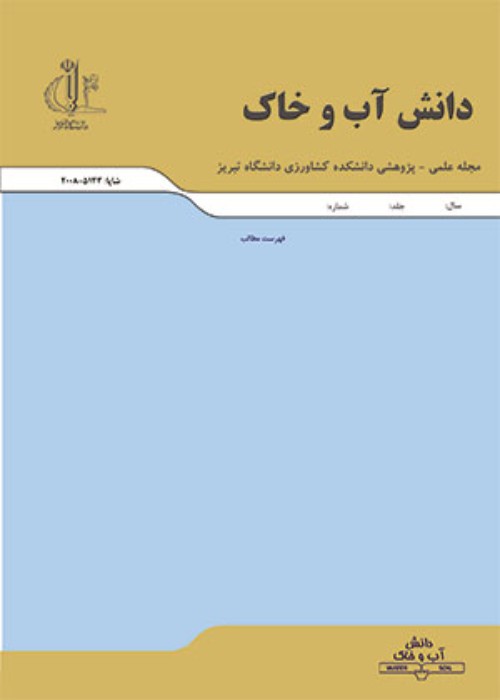Evaluation and Analysis of Status Utilization of Learning and Training Resources by Farmer with Irrigation Systems (Case study: Qazvin province)
Education is the main basis for the growth of the individual and society and plays an important role in the sustainable development of a country. Education in the agricultural sector plays an important role in human resources supply. Numerous studies have been conducted to achieve educational solutions around the world. In Nigeria, educational videos were used to educate farmers in the form of animation, and the results of this study showed that knowledge transfer through information and communication technologies has a positive and significant effect (Mirgohar and Movahed Mohammadi 2008). Inside the country, research conducted in Ramshir has shown that participation in training and extension courses has a significant effect on increasing the level of professional knowledge of farmers and farmers' professional knowledge is directly related to age and agricultural work experience (Zare and Zolali 2015). Review of studies confirms the effectiveness of farmers' educational services and shows that there is always a need for education to properly use land and water resources. In this study, farmers' learning and educational resources were first identified. Then, the utilization status of these resources has been evaluated and analyzed separately for irrigation systems (surface and presssurized) and its relationship with the variables of age, level of education and background of using the irrigation system, by statistical tests.
The study area is located in the central latitude and longitude of Qazvin province between 48 degrees and 44 minutes to 50 degrees and 51 minutes east of the Greenwich meridian and 35 degrees and 24 minutes to 36 degrees and 48 minutes north latitude relative to the equator. The total area under cultivation of crops and horticulture in Qazvin province was on average 334.764 thousand hectares, of which about 2323.439 thousand hectares (equivalent to 66.5%) irrigated and about 1112.325 thousand hectares (equivalent to 33.5%) has been rainfed (Anonymous 2019a, Anonymous 2019b). The research method was the Delphi technique and the survey tool was a questionnaire. The score of learning status of learning and educational resources was calculated using the mean index. Kolmogorov and Smirnov tests were used to check the normality of the data. To compare the score of each item with the average Likert scale (3), a one-sample t-test (parametric test) and one-sample sign test (non-parametric) were used. To compare the three perspectives of farmers, experts, and trainers, Kruskal-Wallis (non-parametric) and Mann-Whitney (non-parametric) tests were used. Moreover, Pearson (parametric) and Spearman (non-parametric) tests were used to assess the correlation between the use of learning and educational resources with the variables of age, level of education and background of using the irrigation system.
Evaluations showed that the utilization status of learning and educational resources from three perspectives of "farmers", "experts" and "trainers" has a score of 1.73±1.08, 2.47±0.94, and 1.99±0.79, respectively (out of a total score of 5) for crop farmers with surface irrigation system, 1.98±1.05, 2.52±0.84 and 2.39±0.95 (out of a total score of 5) for crop farmers with pressurized irrigation system, 2.19±1.08, 2.28±0.87 and 2.12±0.96 (out of a total score of 5) for gardeners with surface irrigation system and 2.55±0.92, 2.38±0.88 and 2.37±1.21 (out of a total score of 5) for gardeners with pressurized irrigation system. The results of correlation tests also showed that there was no significant effect on the use of the learning and educational resources of farmers in any of the groups. Background of using the irrigation system only in the group of farmers with a pressurized irrigation system had a positive and significant relationship and the level of education in all groups had a positive and significant effect. The highest use of learning and educational resources based on the three views expressed in the items "experience gained over time" and "benefiting from the experience of other farmers (leading farmers)" versus the lowest use of items related to "computer software and internet by computer", "mobile programs and mobile internet", "brochures, magazines and educational videos", "radio programs" and "attending classes and workshops".
The results of this research showed that farmers have basic knowledge about information and communication technology and are not fully aware of it and participate less in training classes. Also, in general, the utilization status of learning and educational resources from the three perspectives expressed is in the middle to low state. These results showed capacity building and change in content and how to use learning resources and education is necessary according to the conditions, interests, and motivational contexts of farmers. It is also suggested that to provide sustainable education, the provision of support and monitoring services should be considered on an ongoing basis alongside training programs.
- حق عضویت دریافتی صرف حمایت از نشریات عضو و نگهداری، تکمیل و توسعه مگیران میشود.
- پرداخت حق اشتراک و دانلود مقالات اجازه بازنشر آن در سایر رسانههای چاپی و دیجیتال را به کاربر نمیدهد.


